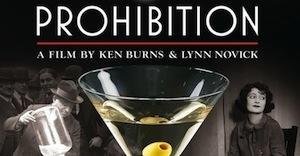%embed1%
Corporate grants and Federal funding have turned Ken Burns into a cultural institution, a guy who now pretty much functions as the USA's national historian. How much you like his previous films The Civil War, Baseball, Jazz or The War (covering WWII) probably depends on how much you knew about the subject before you started watched the films. Even though these documentaries are incredibly long, Burns carefully highlights certain events and personalities in hopes of interesting a broad audience in topics most of us barely remember from high school. People with deep attachments to a subject are likely to focus on what gets left out more than what's actually there, but Burns tries to reach the uninitiated rather than cater to the enthusiast.
Prohibition is the latest in the series, covering the rise and fall of the 18th Amendement to the Constitution, the one that attempted to ban sales and manufacture of alcoholic beverages. If you're a Burns watcher, you already know the drill: evocative period music (this time it's mostly jazz recorded by Wynton Marsalis), slow pans over old photographs, quotes from important figures read aloud by famous actors and a series of talking head historians who are supposed to give context. There's zero effort to tamper with the formula. If that strict adherence to form hasn't started to bother you about Burns, there's a lot to like about this film.

Burns and co-director Lynn Novick (who should maybe consider hiring her own publicist at this point so people realize that she's co-directed almost all "Ken Burns" films) want you to know that the struggle over alcohol was really a cultural struggle over how much immigrants would be allowed to impact American society. They don't quite come out and hit the nail on the head, but it's clear that they want viewers to see parallels with contemporary immigration battles.
Prohibition comes just a year after the publication of Daniel Okrent's Last Call, a really excellent book on the same subject, and Okrent is one of Burns and Novick's go-to historians. Okrent's book goes into far more detail about the run up to the 18th amendment. If you're frustrated with the lack of details about exactly how the National Anti-Saloon League's Wayne Wheeler manipulated politicians, Okrent offers a lot of insight into how single-issue politics works.
Burns & Novick make more of an attempt to give a flavor of what life in the U.S. was like during an era when an overwhelming majority of people (at least the ones in the cities) were openly flaunting the law, pointing out how our newfound tolerance of lawlessness fueled the rise of organized crime. They also use the stories of George Remus and Roy Olmstead's rise and fall as bootleggers to great effect. It's only a focus on Al Capone that feels a little tired. You can't avoid the guy when you're talking Prohibition, but there's not much new on him for even the most casual viewer.
Prohibition is airing on PBS stations this week if you want to catch it for free, but it's out now on Blu-ray and DVD if you're looking for gift ideas for that cousin who's still trying to brew his own beer in the basement. There are a few extras here for the truly committed, but they're not offering the kind of new perspective that makes this set an essential purchase if you've already watched the film on TV.




